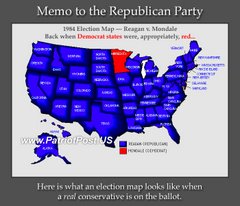Obama's Admiration of China - A Country with No Water
"Everybody’s watching what’s going on in Beijing right now with the Olympics. Think about the amount of money that China has spent on infrastructure. Their ports, their train systems, their airports are vastly the superior to us now which means if you are a corporation deciding where to do business you’re starting to think, Beijing looks like a pretty good option.”
The problem is, China has no water. Beijing may look sleek and gorgeous at the Olympics, but the truth is, water is an apocalyptic issue to the Chinese.
BEIJING - When 16,000 athletes and officials show up this summer, they will be able to turn the taps and get drinkable water — something few Beijing residents ever have enjoyed.China has a long history of championing water conservation, but with an exploding population and often less-than responsible regulatory policies, few measurable results are evident.
In May 2000 the Earth Policy Institute reported that the water table underneath the city of Beijing fell by eight feet, and since 1965 the water table has fallen nearly 200 feet.
In November 2007, The International Herald Tribune confirmed that the underground water table beneath Shijiazhuang, China is "steadily running dry."
The underground water table is sinking about four feet a year. Municipal wells have already drained two-thirds of the local groundwater.In the 1950's, Shijiazhuang was home to 335,000 people. Today, the population of the city and its surrounds is in excess of 9 million. Increased population, accelerated housing and commercial development, combined with policies that have sometimes allowed building at the "lowest points in the city's water table," have created a mammoth problem.
China’s disadvantage, compared with the United States, is that it has a smaller water supply yet almost five times as many people. China has about 7 percent of the world’s water resources and roughly 20 percent of its population. It also has a severe regional water imbalance, with about four-fifths of the water supply in the south.Throughout the country groundwater shows unacceptable levels of contamination. From WorldWatch Intitute:
The water in Zhao Bo’s village on the outskirts of Beijing was a sickly shade of green. After drinking from the local well, Zhao and his fellow villagers could not go a month without suffering from diarrhea.From SciDev.net:
[BEIJING] Some 65 million Chinese rely on underground water supplies that are heavily contaminated with arsenic or fluoride, according to the first national survey of the quality of the country's supply of drinking water.Another problem: China can only barely feed it's people, and water is part of the problem.
China's plan to self-feed 95% of its population "within 12 years," faces huge challenges. Current facts reveal the enormity of the task.
Vice Minister of Water Resources, Hu Siyi, recently announced a price increase on water usage to the consumer. Siyi cited the country's "low-level" of efficiency of agricultural water usage. According to the Vice Minister, 70% of China's water is used for agricultural purposes.
In February 2008, China announced an increase in the country's "minimum purchasing price for wheat and rice," in an effort to protect the profit levels of the farming industry:
The announcement said the minimum purchasing price for different types of rice ranges from 75 yuan (about US$10.4) to 79 yuan per 50 kilograms; while that for wheat ranges between 70 yuan and 75 yuan.I can't think of anything (and I've spent some time thinking about it) in China that is superior - certainly not "vastly superior" to the U.S. Trains? China must have them; the people cannot afford autos. Ports? China cranks out the goods to the West, but we are certainly capable of receiving them in our ports. Airports: I count twelve major airports for China's huge population. Getting around this enormous country must be hell.
Last year the minimum purchasing price for wheat and rice stood at 69 to 72 yuan and 70 to 75 yuan, respectively.
Obama: not much thought given to his remarks - trying to convince Americans how very disadvantaged we are. Most Americans know better.














































